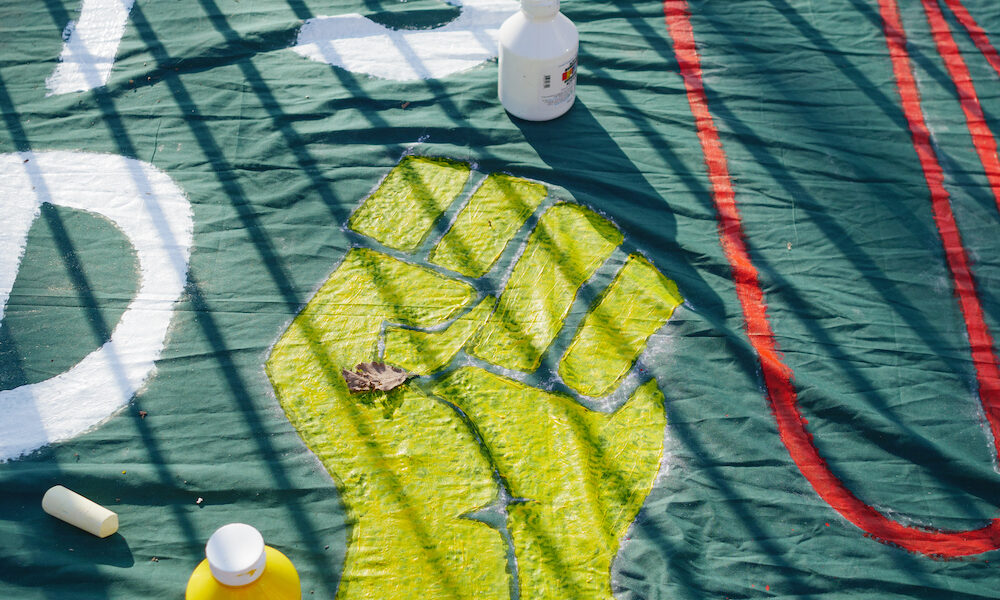Between March 7 and March 18, organizers from Divest McGill occupied the McCall MacBain Arts Building to protest McGill’s multi-million dollar investments in the fossil fuel industry, calling on McGill to confront their complicity in settler-colonialism, white supremacy, and capitalism.
Over the past two weeks, Divest not only called attention to its cause but also welcomed in students and passersby, regardless of their knowledge of the movement. The doors were open for anyone who was open to learning, wanted a bite to eat, or even needed a place to sleep. Through a variety of events such as communal meals, film screenings, reading circles, and conversations, Divest succeeded in transforming the first floor of Arts into a site of learning, protest, and care. In addition to the various events, members and organizers created a collaborative study zone for students, organized meals with food sourced from the community, and supplied a plethora of books and materials related to decolonization, racial justice, anarchist theory, and climate justice for individuals to browse.
The structure of the occupation itself was of great importance to the movement—creating a lasting community within the exploitative, institutional space is integral to Divest’s mission, explained U2 Divest McGill Member Dakota.*
“[The movement is] not just trying to fight for democracy, but enact it,” Dakota said in an interview with The McGill Tribune.
With an emphasis on their non-hierarchical structure, members and organizers hoped to show those who passed by the occupation that the only way forward is together.
For many, the first floor of the MacBain Arts Building during the occupation became a safe haven away from the often isolating feelings that often come with being a student at McGill.
Due to the individualistic nature of academia where each student is responsible for their own learning and competition amongst peers is implicitly encouraged, the importance of community and forming meaningful connections is often overlooked. Members of Divest promote the idea that this structure is not sustainable, nor is it conducive to dismantling the oppressive systems that exist within academia.
In contrast to the individualistic culture academia often fosters, Divest wanted to create a welcoming space for students, a goal that a U0 student, Jordan*, feels they achieved.
“I felt like regardless of my previous knowledge of the movement I was welcome here,” they said.
Another U1 student agreed, describing the positive and constructive atmosphere in Arts.
“People were always so welcoming and passionate,” they explained. “The organizers and occupants were always inviting and encouraged me to learn more about their cause.”
This attention to community building was palpable among the members of Divest themselves.
“Divest has been a very important part of my time at McGill, and has offered me a sense of community even when I couldn’t find it anywhere else,” River,* a Divest organizer, said in an interview with the Tribune.
Emerson,* another Divest organizer, noted that the movement is meant to encourage a new way of living that values community care, inclusion, and equity.
“The success of the occupation can be found in the relationships we’ve fostered and the connections we’ve formed,” Emerson told the Tribune. “Divest aims, through this occupation, to not only educate individuals on anti-colonialism, climate justice, and equity but also to encourage identification with one another.”
Organizers and members illustrate that community care itself is a protest. According to Emerson, this emphasis on non-transactional relations with each other is key in dismantling deep-rooted capitalist ideals that encourage hyperindividualism––and ultimately in working toward creating equitable spaces for all people.
The occupation came to an end on March 18 due to a positive case of COVID-19. However, Divest asserts that this is nowhere near the end of their work toward a better and more equitable world. In their Instagram post announcing the news, they expressed that although there “may not be tents in the arts building lobby tonight, nothing has ended. The community, energy, and power created in the last twelve days goes on.”
*All names have been changed to preserve the organizers’ anonymity.








